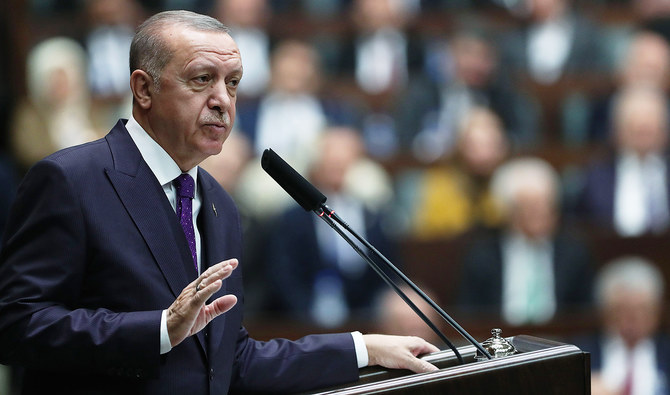- Erdogan’s authoritarianism cited as reasons for his plunging ratings
ANKARA: Turkish President Recep Tayyip Erdogan’s popularity rating has fallen to its lowest level since October 2018, according to a new survey.
Pollster company Metropoll’s findings also showed that public approval for the Turkish leader had dropped by almost two points since December 2019, from 43.7 percent to 41.9 percent in January this year.
Experts believe the main underlying reasons for the wane in support for Erdogan were due to his authoritarianism and power grabbing which were damaging the country’s democratic institutions.
Berk Esen, an academic in international relations at Bilkent University in Ankara, also blamed a reduction in voter confidence on the declining state of the economy and other crises both at home and abroad.
Over the past two years the Turkish lira has weakened by 36 percent and investment in the country has plunged over concerns of state intervention in the economy and heightened geopolitical risks.
“Although the ruling party has in the past chosen politicizing crises to mobilize supporters against the opposition, it no longer seems to have the ability to effectively address them,” Esen told Arab News.
“Many voters feel that the ruling Justice and Development Party (AKP) did not handle the recent earthquake in the eastern province of Elazig or the economic crisis well and worry that Turkish military involvement in Syria is getting out of hand with no tangible achievements.”
The latest deadly attack on Turkish troops in Syria’s northwestern Idlib province has also stirred widespread public debate about the necessity of Turkish presence in rebel-held battlegrounds of Syria.
Coupled with a growing sentiment of cronyism and corruption, these issues had drained the AKP’s support, said Esen. A recent corruption scandal involving Turkey’s Red Crescent had also further tarnished the government’s reputation.
The survey data revealed that Erdogan’s approval rating peaked at 48 percent in October, when he ordered the launch of an offensive into northeast Syria against Syrian Kurdish militia in the region. The nine-day-long operation ended with two separate agreements with Washington and the Kremlin.
Some 82.3 percent of pro-Kurdish party HDP voters, 87.4 percent of main opposition party CHP backers, and 83.3 percent of opposition Good Party voters were unhappy with Erdogan’s leadership, study figures revealed. However, during political crises, such as the 2016 failed coup attempt, Erdogan’s approval ratings were generally found to have surged.
A separate survey carried out by the Turkish CHP (Republican People’s Party), showed that 40 percent of Erdogan’s voters felt the country’s presidential system needed amending, while 54 percent of Nationalist Movement Party (MHP) supporters, the AKP’s staunch ally, also demanded system change.
Themis Research’s latest survey results, released in early February, revealed that Ekrem Imamoglu, the newly elected opposition mayor of Istanbul and a challenger to Erdogan with his inclusive political rhetoric and charisma, topped the polls with a 49 percent approval rating among voters. He was followed by Ankara’s opposition mayor Mansur Yavas (47 percent) and then Erdogan (42 percent) in third place.
Turkey’s opposition mayors, who won the country’s largest cities in the latest elections, have an ever-increasing rate of popularity mainly due to the priority they attach to transparency and fighting corruption, and their condemnations of government wrongdoings in major infrastructure projects.
Esen said: “The effective management of CHP mayors in metropolitan municipalities gives hope to voters that there may be a political alternative to the ruling party.”
He added that Erdogan remained more popular than his party but had lost some support in the past year along with his popularity bounce after the recent Turkish operation in Syria.
“The opposition against him has hardened over the past year since the 2018 presidential election. Faced with the government onslaught, the opposition parties, that in the past failed to agree on anything besides their opposition to Erdogan, have begun to cooperate openly.
“This may have a huge impact on electoral dynamics in the next election cycle,” Esen said.
The next national election is not due until 2023, unless there is a snap election.
Source: Arab News



